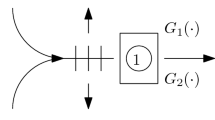Abstract
In this article, we study queuing systems with three classes of impatient customers which differ across the classes in their distribution of service times and patience times. The customers are served on a first-come, first-served (FCFS) policy independent of their classes. Such systems are common in customer call centers, which often segment their arrivals into classes of callers whose requests differ in complexity and criticality. First of all, we consider an \(M/G/1 + M\) queue and then analyze the \(M/M/m + M\) system. Using the virtual waiting time process, we obtain performance measures such as the percentage of customers receiving service in each class, the expected waiting times of customers in each class, and the average number of customers waiting in the queue. We use our characterization to perform a numerical analysis of the \(M/M/m + M\) system. Finally, we compare the performance of a system based on numerical solution with the steady-state performance measures of a comparable \(M/M/m + M\) system.



Similar content being viewed by others
References
Adan, I., Boon, M., Weiss, G.: Design and evaluation of overloaded service systems with skill based routing, under fcfs policies. Perform Evalu 70(10), 873–888 (2013)
Adan, I., Hathaway, B., Kulkarni, V.: On first come, first served queues with two classes of impatient customers. Queue Sys 91, 113–142 (2019)
Baccelli, F., Boyer, P., Hebuterne, G.: Single-server queues with impatient customers. Adv Appl Probab 16(4), 887–905 (1984)
Benes, V. E.: General stochastic processes in the theory of queues. Addison-Wesley Publishing Company, Inc., (1963)
Brandt, M., Brandt, A.: On the two-class m/m/1 system under preemptive resume and impatience of the prioritized customers. Queueing Syst 47, 147–168 (2004)
Brandt, M., Brandt, A.: Workload and busy period for M/GI/1 with a general impatience mechanism. Queueing Syst 75, 189–209 (2013)
Brill, M.J., Posner, P.: Level crossings in point processes applied to queues: single-server case. Oper. Res. 25, 662–674 (1977)
Brill, M.J., Posner, P.: The system point method in exponential queues: a level crossing approach. Math. Oper. Res. 6, 31–49 (1981)
Choi, B., Kim, B.D., Chung, J.: M/M/1 queue with impatient customers of higher priority. Queueing Syst. 38, 49–66 (2001)
Daley, D.: General customer impatience in the queue GI/G/1. J. Appl. Probab. 2, 186–205 (1965)
Garnett, A., Mandelbaum, O., Reiman, M.: Designing a call center with impatient customers. Manuf. Serv. Oper. Manag. 4, 208–227 (2002)
Houdt, B.: Analysis of the adaptive mmap[k]/ph[k]/1 queue: a multi-type queue with adaptive arrivals and general impatience. Eur J Operat Res 220, 695–704 (2012)
Iravani, B., Balcıogğlu, F.: Approximations for the M/GI/n+GI type call center. Queueing Syst 58, 137–153 (2008)
Iravani, B., Balcıogğlu, F.: On priority queues with impatient customers. Queueing Syst. 58, 239–260 (2008)
Sakuma, T., Takine, Y.: Multi-class m/ph/1 queues with deterministic impatience times. Stoch. Models 33, 1–33 (2017)
Stanford, R.E.: Reneging phenomena in single channel queues. Math. Oper. Res. 4, 162–178 (1979)
Takàcs, M.: Introduction to the Theory of Queues. Oxford University Press, (1962)
Zeltyn, A., Mandelbaum, S.: Call centers with impatient customers: many-server asymptotics of the M/M/n+G queue. Queueing Syst. 51, 361–402 (2005)
Acknowledgements
The second author is thankful for the funding by IIT Madras from the IoE project: SB20210848MAMHRD008558.
Author information
Authors and Affiliations
Corresponding author
Additional information
Publisher's Note
Springer Nature remains neutral with regard to jurisdictional claims in published maps and institutional affiliations.
Rights and permissions
About this article
Cite this article
Kumar, V., Upadhye, N.S. On first-come, first-served queues with three classes of impatient customers. Int J Adv Eng Sci Appl Math 13, 368–382 (2021). https://doi.org/10.1007/s12572-022-00313-4
Accepted:
Published:
Issue Date:
DOI: https://doi.org/10.1007/s12572-022-00313-4




